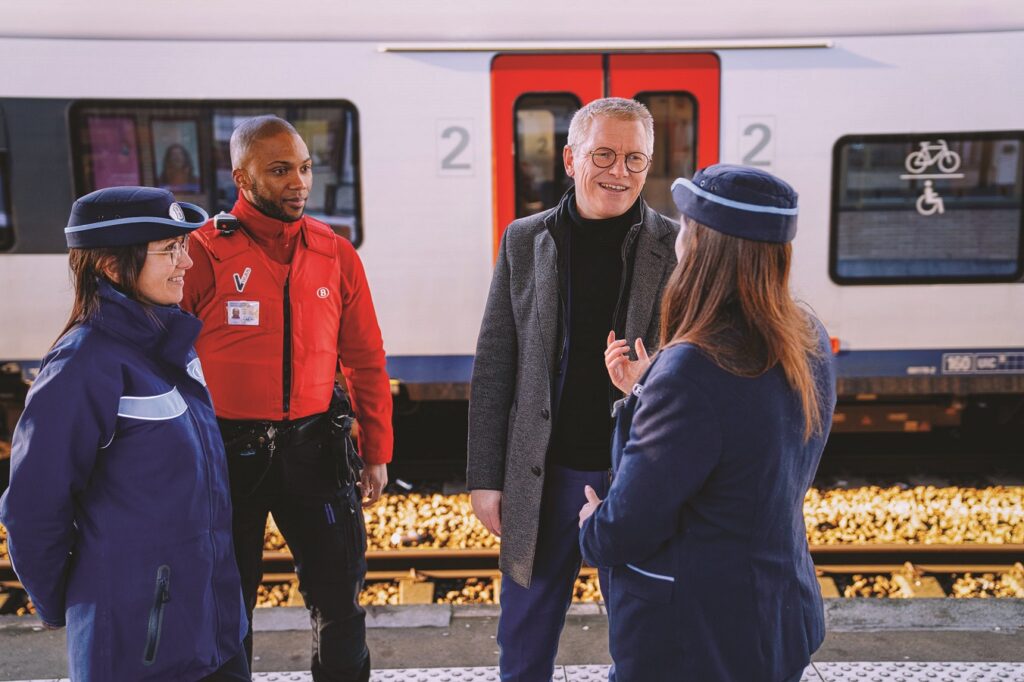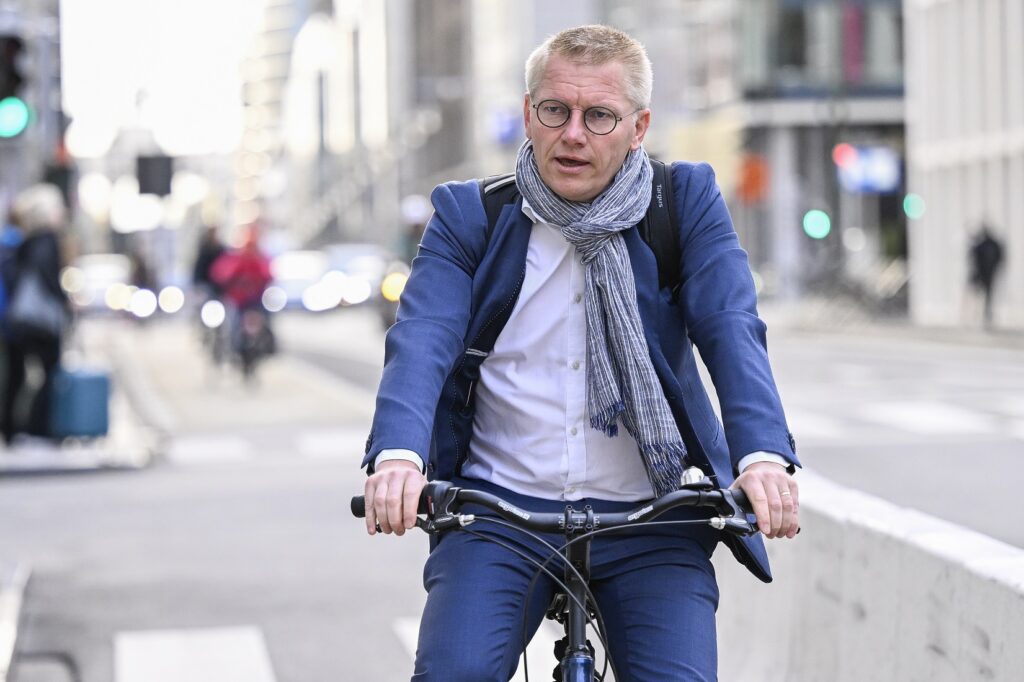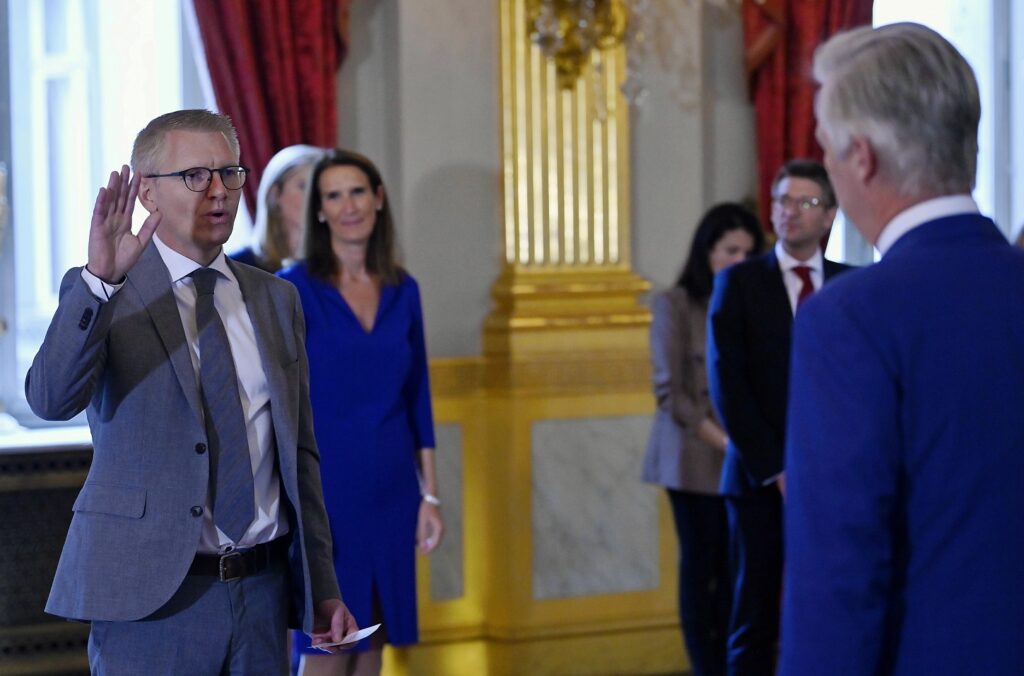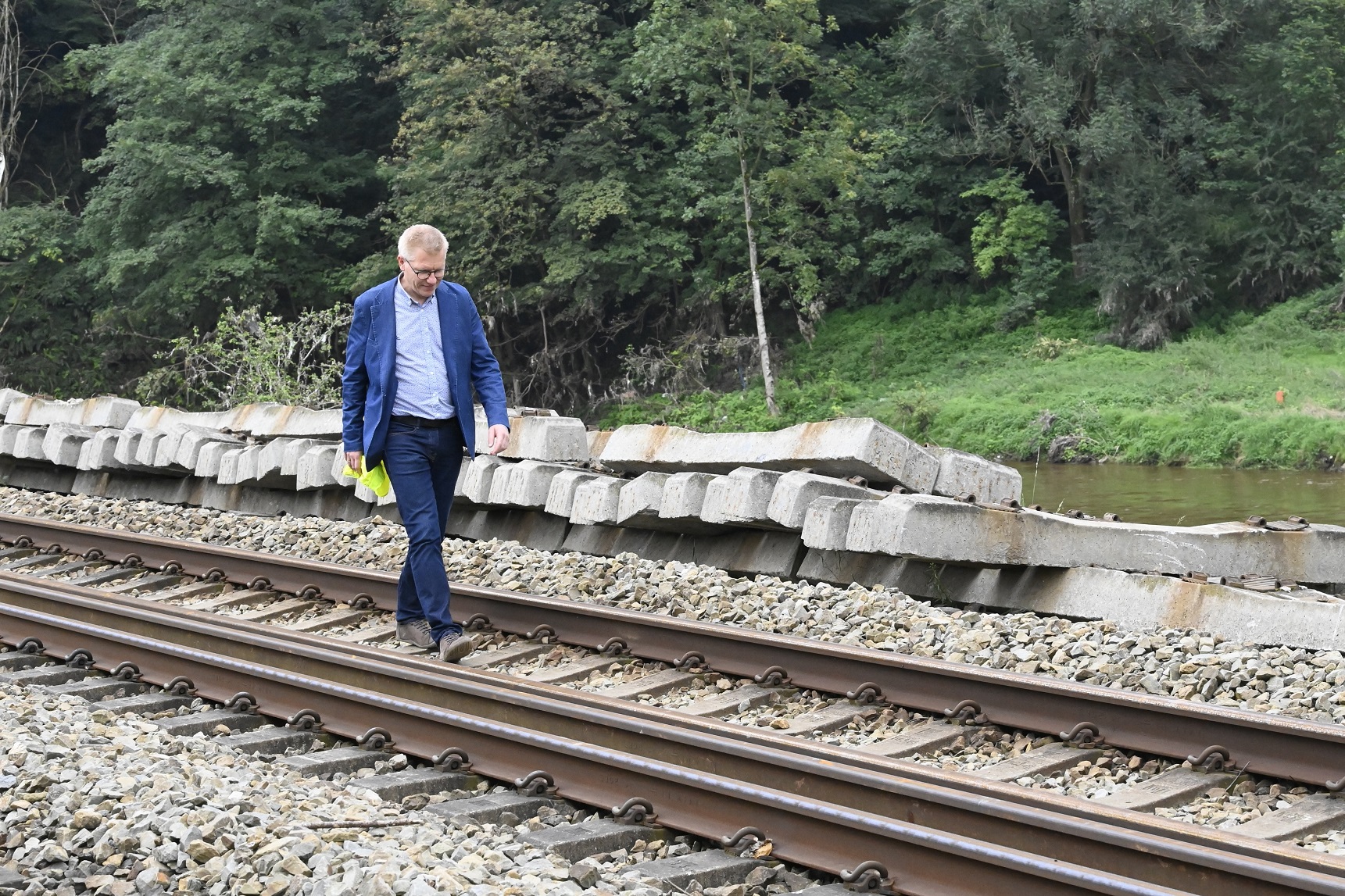When Georges Gilkinet became Deputy Prime Minister and Transport Minister in 2020, he knew that one of his main responsibilities would be the future of Belgium’s struggling national rail company, the SNCB/NMBS, and getting it back on track.
What he hadn’t counted on as much was having to deal with the darkest page in the SNCB’s past: its role in the deportation of more than 25,500 Jews and Roma to Auschwitz-Birkenau and other Nazi death camps during the Second World War. Only 5% survived.
An independent inquiry launched by Gilkinet and Senate President Stéphanie D'Hose uncovered that the Third Reich paid the SNCB some 50 million Belgian francs – €21 million in today’s money – for the transports, which also included transferring more than 16,000 political prisoners to camps and nearly 190,000 Belgians for forced labour.
The payments between 1941 and 1944 were based on a rate set by the German Mitteleuropäische Reiseburo: four pfennigs per man, woman or child “passenger” and per kilometre covered.
Just before we meet, Gilkinet is at the Senate to address a hearing on the inquiry’s shocking findings. I manage to get a place in the chamber, sat by chance next to Bénédicte Frankinet, Belgium’s former Ambassador to Israel and one of a ‘groupe des sages’ set up by the Gilkinet to make recommendations in the light of the inquiry report.
The contrast between the splendour of the 19th century mahogany-panelled plenary chamber and images of deportation cattle trucks displayed on a giant screen above the presidential plinth is unsettling, to say the least.
When we meet a couple of hours later at Gilkinet’s office on the 10th floor of the Finance Tower, overlooking the Botanique garden, the 53-year-old Ecolo politician is still in a reflective mood.
“It was my duty to order an inquiry and I’m very proud of what we’ve achieved. The SNCB is not so happy with what I've done because they feel they’re not responsible for the past. But we have to know our history to be better in the future,” he says.
“This is about renewing our democracy and about respect. There was a total lack of respect shown to Jewish people in the Second World War. We still see this problem today, also with some of the attitudes being expressed about Muslims and other groups.”
Tomorrow’s trains
As a regular rail commuter, I’m also keen to get Gilkinet’s take on the present-day SNCB. His staff have advised me that the interview will be in French so I’ve brushed up on some of the more arcane, trainspotting vocabulary en français.
However, as soon as we sit down, Gilkinet declares he wants to talk in English. “I missed my class this week and I need the practice. This can be my English lesson,” he laughs.
As he prepares to seek his fifth term as a member of the Chamber of Representatives in June’s election – he’s Ecolo’s lead candidate in the province of Namur – I ask Gilkinet what he sees as his main political achievement during the current mandate.
He replies without hesitation: securing long-term financing for the SNCB and Infrabel, which is responsible for maintaining and improving the rail network. “It's the first time in Belgian history that we have such a contract for 10 years, guaranteeing new investment for the future. It’s worth €44 billion or a bit more than €4 billion a year. This means we can renew the infrastructure to carry new trains and more trains,” he says.

Talking to train staff
Infrabel has already announced that it will spend €310 million on upgrading the oldest high-speed line on the Belgian network, the HSL1 from Brussels to the French border.
“We also plan to run more night trains to European cities – they travel free of charge on the Belgian network – and we’re working with industry to double the volume of freight goods carried by rail by 2030,” Gilkinet adds.
Railway expansion is also a key theme in his discussions with his EU transport ministry counterparts during Belgium’s six-month stint from January to June this year as the European Union’s rotating presidency.
“The train is the backbone of mobility of the future, the greenest way to travel,” he says. “We also need to be a leader in energy in Europe so that we can offer cheaper tickets for passengers.”
No shortage of ambition there, but what about issues that Belgian commuters face in the here and now such as frequently late or cancelled trains?
Gilkinet admits this is a problem, especially when ageing infrastructure and rolling stock are a factor. “We're doing everything we can, but we can’t change things from one day to the next,” he says. “We’re paying the price for a lack of investment in the past. It's like a house. If there’s a problem with your roof and you don't solve it, it will only get worse and then it takes much longer to fix.”
Women on board
Another issue is how to encourage more women, older and disabled people to travel by rail. Gilkinet admits that safety is a concern. “If you want more women especially to travel by train, they have to feel secure,” he states.
One of his priorities is to see more gender balance in the rail workforce. In 2022, only one in five SNCB staff were women and Gilkinet called on CEO Sophie Dutordoir to make female recruitment one of her primary missions.
I ask if the situation has improved.
“Yes, but not enough,” he replies. “It’s an issue in all the rail companies in Europe. But it's now a topic. We still see a lack of female candidates, especially in engineering roles. And it’s not just about attracting more women in the sector: we also need to be more open to people coming from abroad.”
As a Green, Gilkinet is unsurprisingly passionate about getting more of us to commute on two wheels rather than four. His ‘Be Cyclist’ action plan envisages more space for bikes at rail stations and for all new trains to have at least eight spaces for bikes. He is also backing MyBike, the first national bike register to combat thefts.

The minister bikes to work, and for fun
While he has access to a ministerial car and driver, Gilkinet cycles in Brussels. “I want to set a good example but I don't do it for show. It’s a pleasure,” he says.
Has he had any accidents? “No, not so far. Fingers crossed.”
His pro-rail, pro-bike agenda doesn’t come cheap but Gilkinet managed to persuade his government partners in Prime Minister Alexander De Croo’s coalition to back his ambitious strategy.
Nuclear headache
However, Gilkinet, together with his Green colleagues Petra de Sutter and Tinne Van der Straeten, have been less successful in winning support from their government colleagues over the phase-out of Belgium’s nuclear plants.
Indeed, the liberals in the coalition – De Croo’s Open VLD and the francophone Mouvement Réformateur party - want to keep the reactors at Doel and Tihange going for 20 years longer instead of the ten years previously agreed.
In March, Premier De Croo hosted a global nuclear energy summit in Brussels, championing the role of nuclear in the fight against global warming, and Ecolo has accused him of lobbying against the EU’s flagship Nature Restoration Law, designed to reverse decades of damage to ecosystems and wildlife.
Gilkinet feels De Croo crossed a line, especially with the pro-nuclear summit. “There was no agreement about this. He just did it. I phoned him and said, ‘Alexander, this is really not a great idea.’ I told him he wasn’t acting as a prime minister but as the leader of the Liberals. He didn’t have a mandate for it. He was in campaign mode, giving his own point of view. He didn't speak in my name.”
I gently suggest that perhaps the Green view on nuclear is outdated, given that it produces zero emissions.
Gilkinet is having none of it. “Nuclear is not the energy of the future because it produces dangerous waste and it’s very expensive. It costs Europe €400 billion a year.”
He is pleased, however, that the Belgian Presidency of the EU reached an inter-institutional deal in March on the so-called Single European Sky, which aims to improve air traffic management. Gilkinet says it will result in the aviation sector producing fewer carbon emissions. “It’s 10 years that we’ve been waiting for an agreement and we did it.”
Far-right threats
But Gilkinet’s is also focused on domestic matters: the June federal election saw the Ecolo vote collapse as they fell from 13 to just three seats.
He admits he is deeply worried about the seemingly unstoppable rise of the populist, nationalist right across Europe. He points to the recent election successes of Geert Wilders’ far-right Party for Freedom (Partij voor de Vrijheid or PVV) in the Netherlands, and notes that his Italian counterpart is Matteo Salvini, from the far-right Lega party. “And I’m afraid of what will happen in France in the next presidential election,” he adds.
In Belgium, he warns about the far-right Vlaams Belang, which he calls racist. “You have to respect the result of democracy, but I will always fight their ideas,” he says, begrudgingly accepting that he might have to engage with their leader Tom Van Grieken. “I don't speak to far-right parties unless I’m forced to. If he asks me a question in Parliament, I will answer because it's my duty to answer. But I won’t be asking him about his children or wife. We don't have a personal relationship.”
Gilkinet is also scathing about Vlaams Belang’s policies. “They’re the opposite of what we stand for in the Greens. They want women at home and to send people ‘back to their country’. But their country is often Belgium! Immigrants have a lot to bring us, and I want a more open society. As Greens, we are more internationalist.”
Farmers’ friend
The Deputy Prime Minister is also outspoken about the challenges faced by Belgium’s farmers.
He’s vehemently opposed to the EU negotiating a free trade agreement with the South American Mercosur group, which he says will result in a surge of low-quality imported produce, and he is calling for a reformed Common Agricultural Policy (CAP) to prioritise a better deal for small farmers.
I put it that some people might feel that the farmers are already doing quite nicely thanks to generous taxpayer-funded EU subsidies and that their recent protests in Brussels went too far. Given that Ecolo is also in favour of tougher environmental standards in agriculture, can Gilkinet still present himself as the farmer’s friend?
He delivers a valiant defence of both. “Look, biodiversity is our life insurance. We need it for the future, for our children and grandchildren,” he says. “But it's also very important for the business of our farmers. They are the victims of liberalism and the free market. It’s not fair competition for our agriculture.”
His solution involves doing more to help farmers transition to greener practices, including setting minimum prices, particularly for smaller farmers. “Farmers do a lot of good. They produce the food we eat, they plant trees, they look after the land. They’re taking positive action for our climate and the environment. We need to pay them for this,” he says.
That sounds fine, but how would he – and voters – feel if this means it costs twice as much to buy a carton of milk or joint of meat? “You know, I understand that the consumer wants to have the lowest price possible but the lowest price possible has a price,” he says. “You have to fix a good price, that is accessible for the consumer but correctly pays the producer.”
Courtroom defeat
Gilkinet is not shy about proclaiming his views on plenty of other topics – and it’s got him into hot water on more than one occasion. In 2018 he was caught up in a long-running legal saga known as ‘Kazakhgate’ after taking part in a parliamentary inquiry into the circumstances surrounding how Patokh Shodiev, a billionaire from Kazakhstan, acquired Belgian citizenship back in 1997.
Gilkinet made incriminating comments in the media which resulted in him being sued for defamation. While he won the initial case in Namur, the court of appeal in Liège ruled that his parliamentary immunity did not cover opinions given to the media and ordered him to pay a symbolic one euro in damages. In December 2022, the Court of Cassation confirmed the judgment.
The case must have been stressful, I suggest.
“What was stressful is that one day a lawyer, a ‘huissier’ as we call them, came to my home. My wife was alone. He told her, ‘Your husband has to go to justice’. She was not so happy and called me, saying: ‘What did you do – again?’”
Though found culpable, Gilkinet does not come across as overly repentant. “I considered what had happened as potentially the most important political scandal in Belgium for 20 years, so it was my duty as a member of parliament to try and get to the truth. People have to know the truth. My only regret is that I didn’t find the evidence. We didn’t find the smoking gun that would prove our case. Maybe I will write a book about it one day,” he says.

Taking his oath as a minister
While we’re talking about regrets, I ask him if he ever misses his former profession as a sports journalist with the regional television station Canal C, now called Bouké. “It’s a kind of joke, but I often say I miss my career. I always wanted to be a journalist but I’m only a minister,” he says.
But in 2001, he took up a job offer in the French community parliament. He started working for the Ecolo group in the Chamber of Representatives in 2004 and stood successfully as a deputy three years later. Re-elected three times, Gilkinet became co-leader of the group in 2018, until taking office as Deputy Prime Minister two years later.
He admits his workload has increased significantly since and I ask how this has affected his wife, a primary school teacher, and children, Léa and Arthur, both in their 20s.
“My children are busy studying to be doctors. They’re doing well. It’s more difficult for my wife because I’m hardly ever at home. And when I am, I’m often tired or on my computer or my phone. Being a politician means a lot of sacrifices if you do the job properly. I know my wife is looking forward to the day I stop and she’s waiting – how do you say it? – to be a granny.”
No pressure for the children, then.
Perks of the job
Gilkinet’s job as one of the Vivaldi coalition’s seven Deputy Prime Ministers comes with some nice perks, not least an eye-catching salary, €221,000 a year before tax, or between €13,000 to €14,000 net per month. That’s more than Emmanuel Macron takes home.
I’ve read that Gilkinet hands around 20% of his salary to the party. “It’s more than that,” he corrects me. “It’s 40%. I’m not in politics to be rich. The Greens want to reduce Ministerial salaries. It’s in our programme. My objective is just to be useful. If I’m useful perhaps, I will be happy.”
Mission for great and good
The inquiry into the role of the SNCB during the wartime occupation was led by historian Nico Wouters, director of the Study and Documentation Centre for War and Contemporary Society, better known by its French-Dutch acronym CegeSoma.
His research – now collected in a book entitled Le Rail Belge Sous L’Occupation (Bezet Bedrijf in Flemish) – found that the German authorities demanded only “absolutely reliable” Belgian rail workers should be used for the deportations and that there were few protests.
The ‘groupe des sages’, a committee of the great and good set up to make recommendations following publication of the CegeSoma report, include Herman Van Rompuy, the former President of the European Council and former Prime Minister and Françoise Tulkens, former vice-president of the European Court of Human Rights.
Their remit is limited. For example, financial compensation is ruled out for the descendants of those deported on SNCB trains. However, Gilkinet hopes that the group, which is due to report back in November, will issue broader practical recommendations for the future, notably on how to halt the spread of racial hatred.

